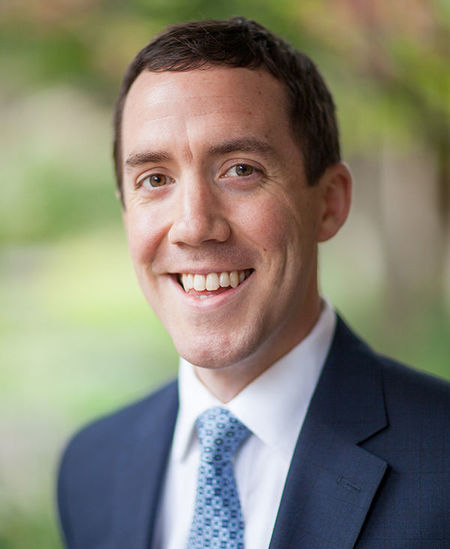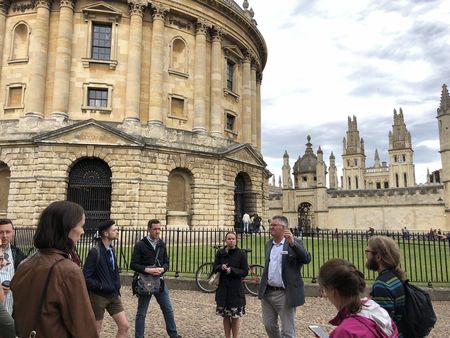
This Q&A is part of an ongoing series with Arts and Letters graduate students. Read more Q&As with graduate students and faculty members here.
Philip Byers is a doctoral candidate in history whose research and teaching interests include U.S. religion and political culture, with a particular focus on the interaction of religion and foundation philanthropy. He received a bachelor’s degree in history and a master’s degree in higher education from Taylor University.
What are you researching right now?
My current project examines the ways that select philanthropic foundations — with special attention on the Indianapolis-based Lilly Endowment — financed American religious communities in the decades following World War II.
What inspired you to research philanthropic foundations?
I grew up in Indiana, constantly running across the “Lilly” name but never really pausing to question it. It was simply part of the environment here, as ubiquitous as corn and soybeans. Early in graduate school, I encountered references to the Lilly Endowment in archives while researching unrelated projects, and those coincidences piqued my interest. As is so often the case, once you’ve noticed something, you can’t stop noticing it.
In preparation for my qualifying examinations, I began to recognize how many of the books I was reading about religious history had, in fact, been at least partially subsidized by the Lilly Endowment. That was the clarifying moment — an entire funding infrastructure existed, in plain sight and credited in the acknowledgments sections of these scholarly books, but never itself the topic of research.
This project seemed like a way to tell a very particular story about the Lilly Endowment’s support for American religion, while also speaking to broader 20th-century questions of democracy, voluntarism, political economy, and civil society.
Why is this research especially relevant now?
In the past few years, several journalists and commentators have begun to question the propriety of so much power lying in the hands of a few tech billionaires. Those clarion calls have largely focused on matters of public policy. But anyone with an interest in American religious life should consider the topic as well.
We know that fewer Americans now affiliate directly with organized religion; this is happening even as economists raise concerns about widening wealth inequality. A shrinking donor base within religious communities and an increasing concentration of wealth combine to suggest that the role of external money in organized religion, both in the past and in the future, merits some focused attention.
 With funding from Notre Dame’s Keough-Naughton Institute for Irish Studies, Byers spent two weeks this summer at Oxford University, participating in the 2019 IRISH Seminar.
With funding from Notre Dame’s Keough-Naughton Institute for Irish Studies, Byers spent two weeks this summer at Oxford University, participating in the 2019 IRISH Seminar.
How did you choose to come to Notre Dame?
Choosing Notre Dame required very little soul-searching or discernment. For anyone interested in American religious history, the resources here are virtually unmatched.
Scholars on the Notre Dame faculty — across numerous departments — are among the keenest minds in the field. Collaborative working groups, like the Colloquium on Religion and History, provide weekly chances for graduate students and faculty to workshop their research and writing. Institutions like the Cushwa Center for the Study of American Catholicism provide lectures and seminars that enrich the co-curricular experience. And the department’s alumni occupy professorships across the country, linking students to a dynamic cross-generational network of current scholars.
Studying American religious history at Notre Dame has been a total privilege. I also appreciate the way Notre Dame pursues research excellence while still prioritizing the undergraduate experience. Even as I have loved the chance to spend time growing as a researcher and writer, I’ve been grateful to do so in a context where undergraduates are constitutive, not incidental, to the experience.
“Choosing Notre Dame required very little soul-searching or discernment. For anyone interested in American religious history, the resources here are virtually unmatched.”
What makes the Ph.D. in history program distinctive, and why is it the best fit for you?
One thing that really sets the Ph.D. in history program at Notre Dame apart is its unique combination of resources and collegiality. With even a little perseverance, students in the program can find ample resources to support our work, but we don’t pay a price for that in terms of community.
Peer-to-peer interactions here are generally supportive and strong, and faculty members engage with us as colleagues in numerous collaborative venues. The welcoming academic community is a major distinctive for a research university of Notre Dame’s caliber.
How do you feel the program is preparing you for the job market?
I would love to have the chance to teach college students while continuing my research and writing, and the Ph.D. program in history has equipped me to do that in numerous ways — with rigorous coursework that provided a foundation for my scholarship and teaching, with generous funding that has financed research trips and subsidized presentations at academic conferences, and with introductions to a scholarly network of peers and advocates who can help open doors.
Originally published by at al.nd.edu on November 15, 2019.